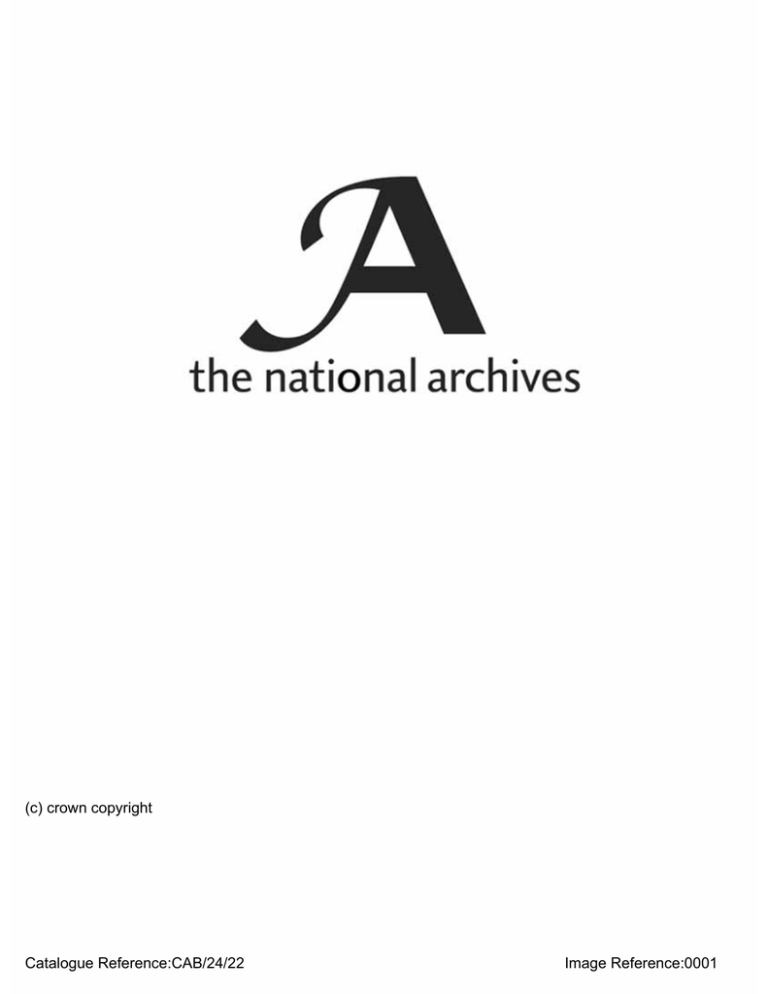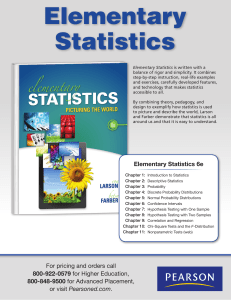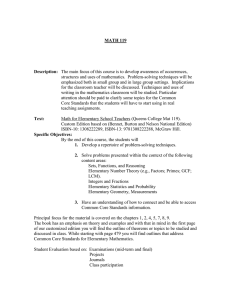(c) crown copyright Catalogue Reference:CAB/24/22 Image Reference:0001
advertisement

(c) crown copyright Catalogue Reference:CAB/24/22 Image Reference:0001 umenUyhe^Property nf His Britannic Maiesty's Government.] Printed for the use of ilie Cabinet. August 1917. 0 * A CONFIDENTIAL PENSIONS FOE TEACHEES. 1. O N t h e 20th February t h e W a r Cabinet authorised me to proceed with legislation to establish a system of pensions for Secondary and Technical School Teachers, for whom there is a t present no S t a t e system of superannuation at all. The necessity for such a system has long been recognised. I t s establishment was promised in 1913-1914, it formed the subject of enquiry by a Departmental Committee, which reported in 1914, and funds for t h e purpose were made available. Action, however, was suspended on the outbreak of war. 2. W h e n I approached t h e W a r Cabinet in February last, I intended to proceed generally on t h e lines recommended by t h e Departmental Committee, viz. :— (a.) By extending to teachers in Secondary and Technical Schools t h e benefits of t h e superannuation and disable­ ment allowances now given to teachers in Elementary Schools; and (&.) By establishing a compulsory system of insurance to secure benefits maturing at t h e age of 60 by means of annual premiums amounting to 10 per cent, of salary, half of t h e premiums to be covered by a S t a t e subsidy. The cost of these proposals would be about 150,0001. a year to begin with. 3. I t was, 1 think, always recognised by my predecessors t h a t the establishment of such a system for teachers in Secondary and Technical Schools would involve, a t no distant date, reconsideration of the existing system for Elementary School Teachers, and par­ ticularly of the system of deferred annuities, to the cost of which no S t a t e contribution is made, and t h e financial advantages of which are very meagre. The Elementary Teachers, while recognising t h a t our proposals would give Secondary and Technical Teachers greater advantages t h a n t h e y themselves enjoy, offered no objection, and indeed were willing to support them, obviously in the hope t h a t when the principle of subsidised insurance had once been established it would be extended to them, together with minor improvements of their own system. 4. Not only has action been deferred for three years, leading to a renewal of the agitation on the part of the Elementary Teachers for a better pension S3 stem, but it has become universally recognised t h a t t h e establishment of t h e teaching profession on a sound basis is essential to educational advance, and t h a t the unity of t h e teaching profession should, as far as possible, be recognised, and indeed emphasised. A great advance is now being made by means of t h e funds provided in the present estimates towards securing adequate salaries for teachers, but it is undeniable both t h a t t h e profession as a whole cannot be placed on a satisfactory footing without a good penskon system, and also t h a t S t a t e intervention in the matter of pensions is (under t h e English system of local administration and divided responsibility between t h e central and local authorities) even less open to objection t h a n S t a t e intervention in the m a t t e r of salaries. [858j 7 2 5. A Bill to give effect to my proposals for Secondary and Technical School Teachers'pensions is i n ' d r a f t and could be made ready for introduction at an early date, but before proceeding I think it is necessary to consider whether the scope of the measure should rrnt be widened so as to include the reformation of the system for Elementary Teachers as well, and so as to include all qualified teachers (certificated and uncertificated) and bring in certain small miscellaneous classes of teachers in State-aided schools. The additional cost of extending t h e scope of the measure in this way, on the basis of a State contribution of 5 per cent, of salaries, and possibly of modifying the existing system in certain respects, would be about 800,0001. to l',000,000jfa year, rising with increase in number of teachers and increase in their salaries. 6. I feel that I might find, considerable difficulty in passing my Bill for Secondary and Technical Teachers unless ] were authorised to give a pledge that the case of the Elementary Teachers would be dealt with on similar lines at a very early date ; and if such a pledge were fgiven I should find it difficult to explain why Elementary Teachers could not be included in t h e Bill, and to convince Parliament t h a t it was necessary to deal with them in a separate measure. Moreover, a pledge is very embarrassing till it is redeemed and is apt to give rise to much controversy on t h e question whether the subsequent measure adequately redeems it. 7. The arguments in favour of confining the Bill to Secondary and Technical Teachers in the first instance may be stated as follows :— (1.) As they have at present no pension system a t all their case is more urgent. (2.) The inclusion of the Elementary Teachers would involve provisions for the winding-up of t h e existing system (though this would in itself not be a difficult matter), and being a larger measure would raise more questions for debate and make greater demands upon Parliamentary time. (3.) The proposed system of pensions involves a new principle of - co-operation with Insurance Companies, and it is desirable to obtain experience in working it in connection with the comparatively small number of 15,000 Secondary and Technical Teachers before embarking on the much bigger business of working it for about 150,000 Elementary Teachers. (4.) I t will be po-ssible though not easy for the Board during the war,' with their depleted staff, to bring a pension system for Secondary and Technical Teachers into operation, but it will be very much more difficult to face the bigger task of dealing with the Elementary Teachers and winding up their existing scheme. In the nature of the case, the teachers will press for speedy action directly the Bill is passed. (5.) The large additional expenditure involved by extending the measure to Elementary Teachers would be deferred. 1 8. The arguments in favour of extending the scope of the measure to Elementary Teachers are :—­ (1.) The desirability of treating the profession as a whole and showing t h a t the Government regard all types of teachers as forming one national service. (2.) If, as is essential, a pledge has to be given to deal with t h e case of Elementary Teachers in a further measure— (a.) I t will be difficult to explain the advantages dfthe superiority of two measures over one ; (b.) T h e pledge will have to be speedily redeemed, and further demands made on Parliamentary time when t h e pressure of all kinds of legislation m a y be great and urgent. A single measure-, though i t may raise more points of controversy would probably in t h e end t a k e less time. (c.) As t h e restricted, measure cannot possibly g e t beyond a first reading this session, even if it gets so far, the preparation of a comprehensive measure would involve "no delay. s (3.) If we s t a r t with a measure for Secondary a n d Technical Teachers only, we shall have to reproduce h r it some unsatisfactory features of t h e existing system of Elementary Teachers' superannuation and disablement allowances; then, when we come . to reform t h e Elementary system in a separate measure, we shall have to go back upon our measure for Secondary and Technical Teachers and amend it also. This procedure is rather absurd. ..9.. I regard the establishment of a pension system for Secondary and Technical Teachers as a m a t t e r of paramount importance, a n d if I thought t h a t a measure confined to them would have a better chance of passing than a comprehensive measure including Elementary Teachers, I should be most reluctant to expose it to any additional risk by widening its scope. I am disposed, to think, however, t h a t the chances are t h e other way, and t h a t a comprehensive measure would not only be better in itself, b u t would have more driving power behind it. I recognise t h a t t h e administrative difficulties of bringing into operation t h e larger measure, and even t h e smaller measure, are by no means inconsider­ able, and t h a t it would not be a t all easy during t h e war to give speedy effect to it. B u t I think we must face this, and do our best with such assistance as we can g e t from outside t h e Civil Service, even though there may be considerable delay and consequent grumbling after t h e measure is passed. 10. I feel t h a t t h e establishment of t h e Teaching Profession upon a satisfactory financial basis is t h e essential preliminary to a permanent improvement in our Educational System. The Govern­ ment have already taken t h e first steps in this direction by t h e provision in t h e Supplementary Estimates - for t h e current year of a sum which will enable substantial additions to be made to teachers' salaries; it remains to provide an adequate Pension Scheme for t h e whole Teaching Body. Such a scheme will complete t h e work which t h e Government have already begun, and will exercise a powerful influence in making t h e calling of a teacher in our National Schools attractive to young men and women all over- t h e country. The sooner a comprehensive measure is placed on t h e S t a t u t e Book, the better it will be for our Schools. H . A. L. F . August 1,1917. rKHTFBD AT T U B rOSHIGN 0 * . : 2 K *T 0 . R. HARBUOB.-2/8/1917,




